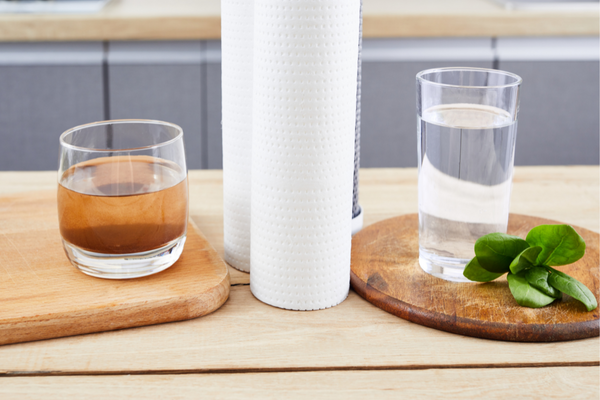
Why Do I Need a Water Filter?
A water filter is an important part of every homeowner's toolkit. It is responsible for removing contaminants from your water supply so that you can enjoy clean, safe water for drinking, cooking, and bathing. There are many different types of filters on the market, so it can be tricky to figure out which one is right for you. In this blog post, Oak Plumbing will explain what a water filter does and why you need one in your home!
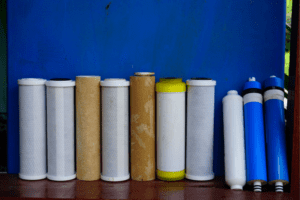
What is a water filter?
A water filter is a device that removes impurities from water by using a physical barrier, chemical process, or biological process. Filters can be used to remove solid particles, like sediment and sand, from your water supply. They can also be used to remove dissolved minerals and chemicals, like chlorine and lead. Some filters even remove bacteria and viruses from your water.
How do water filters work?
Water filters work by passing water through a series of filters. The first filter might be a screen that removes large particles, like sediment and sand. The second filter might be made of charcoal, which removes dissolved minerals and chemicals. The third filter might be a UV light, which kills bacteria and viruses.
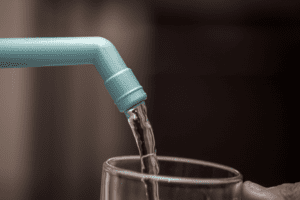
What are the different types of water filters?
Mechanical filter
Mechanical filtration is a process of water purification that uses a barrier to remove any solid particles, dirt, or debris. A mesh strainer that filters out large pieces is an example of a mechanical filter. Another type of mechanical filter is one with ceramic material and tiny pores; this traps pathogenic organisms. Most mechanical filters have what's called a micron rating, which measures how well the filter eliminates particles based on size.
- 5 micron - Will remove most particles visible to the naked eye.
- 1 micron – Will remove particles which are too small to see without a microscope.
- 0.5 micron - Will remove cysts (giardia and cryptosporidium).
Absorption filter
Carbon is an excellent material to use for water filters because it has a broad surface area with multiple small depressions that can capture impurities. The majority of at-home filters use granular activated carbon (GAC), which lowers bad tastes and smells by trapping them in the carbon pores. However, more costly filters usually utilize carbon block elements, which are often more adept at removing particles, and have a micron rating system to determine how well they perform.
Sequestration filter
Chemicals referred to as sequestrants bind mineral and metal ions in water so that they stay circulated rather than precipitating, which could result in cloudiness or staining. It's important to remember that sequestering agents don't eliminate metals or minerals from water; they only keep them suspended.
Chelating agents are chemical compounds that can bind tightly to metal ions. Ethylenediamine is one example of a simple chelating agent. In medicine, they're used to remove toxic metals from the body by forming several bonds with a single metal ion.
When an atom loses outermost shell electrons, it forms a positively charged ion called a cation. With fewer electrons than there are protons in the nucleus, these particles are strongly attracted to each other--making metal ions smaller than if they were corresponding atoms without any charge.

Ion exchange filter
Ion exchange is a process where magnesium and calcium ions in hard water are replaced with other harmless atoms, such as sodium or hydrogen. This happens by the magnesium and calcium binding to resin--a small, sand-like bead with a negative charge. Once all of the magnesium and calcium has bound to available resin, you will no longer have to buy more!
Ion exchange water softeners operate by periodically flushing the resin with a brine (salt) solution. Even though the bond between magnesium and calcium and the resin is stronger than sodium's bond with the resin, over time - due to all ofthe salt used - magnesium and calcium flow into a discharge tube.
For the average person consuming two gallons of water a day with an average hardness of 10 grains per gallon, they're ingesting about 300mg of sodium daily. While some people don't have to worry about things like high blood pressure or coronary artery disease, this amount can negatively impact the health of others significantly.
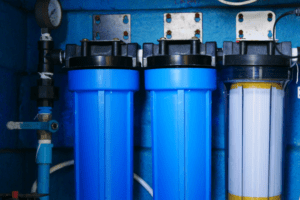
Reverse osmosis filter
With reverse osmosis, we can take water from the ocean and remove salt and other impurities. This technology forces seawater through semipermeable membranes that are tightly wrapped. Under high pressure, only smaller molecules of water are able to pass while the larger particles, such as salt, get left behind.
The process of reverse osmosis water filtration purifies regular water by removing contaminants through the use of a semipermeable membrane. When pressure is applied to feed water, it flows through the specialized filter. The clean drinking water that comes out on the other side is called permeate, while concentrated waste or brine solution stays behind.
A semipermeable membrane is a type of selective barrier, allowing some molecules to pass while stopping others. When such a membrane separates water and a more concentrated solution, osmosis occurs as water flows from the side with less concentration to the side with greater concentration—in order to equalize concentrations on both sides of the membrane.
The process of reverse osmosis is the opposite of what happens during regular osmosis—in this case, pressure is applied to force a flow from the more concentrated solution into a volume of clean water on the other side of the semipermeable membrane. This leaves contaminants behind in the original solution.
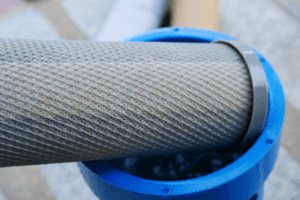
Combination filter
Most water filters or filtration systems use more than one method to achieve a certain level of water purity. For example, household water jug filters usually employ mechanical, absorption, and ion-exchange while inline filters typically utilize mechanical and absorption with the possible addition of sequestration if the filter prevents scales. A reverse osmosis system can use one or more of these filtration methods: mechanical, absorption and reverse osmosis. If you understand how the five different methods work and can be combined, you'll have an easier time deciding which filters to use for a given purpose.
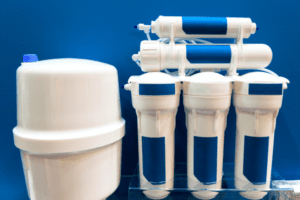
Why do I need a water filter?
There are several reasons why you might need a water filter. Maybe your municipality doesn't treat its water well, or perhaps there's been a natural disaster that has contaminated the local water supply. In either case, using a filter can help remove harmful contaminants from your water, making it safe to drink.
What are the benefits of water filters?
Clean water
We often times do not think about or realize where our water comes from and if it is clean. We turn on the faucet in our home and drink or use the water without a second thought, but that water has to be safe for us. In order to make sure the drinking water in your home is pristine, installing a whole-house filtration system will give you peace of mind.
A whole-house water filtration system will make your home's water pure, no matter where it comes from. That includes the city's water treatment plant, a well, or rainwater. There are different types of filters designed to remove specific contaminants. The kind you need depends on how contaminated your water is and what kinds of impurities you want to get rid of.
Eliminates the need for plastic bottles
If you're concerned about the quality of your tap water, a filtered pitcher is an easy and affordable solution that will save you money and reduce plastic waste.
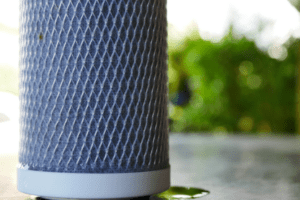
Alleviate skin conditions
If you have sensitive skin, using filtered water can help reduce further irritation and eczema flare-ups that are typically caused by minerals or chemicals found in treated water.
Eliminates hard water to reduce plumbing costs
Not only does hard water negatively affect the quality of your drinking water, but it also causes big appliances like dishwashers and fridges to work less efficiently because they have to use more water. To protect your plumbing and keep your appliances working well for longer, install a water filtration system. Over time, the pipes and valves inside these appliances can become clogged with scale from hard water. In some cases, this might require replacing expensive parts. This wear and tear can decrease the lifespan of your appliances by up to 50%. Furthermore, scale buildup from hard water utilization decreases appliance efficiency by up to 29%, which also causes energy bills to go up.
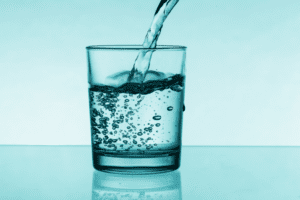
Improved taste
The chemicals used to purify tap water can oftentimes make it taste terrible. However, by using a water filter, you can eliminate those same chemicals and improve the flavor of your water.
Eliminates deposits and soap scum on clothes
Hard water often leaves mineral deposits on clothing fibers, resulting in soap scum buildup. By using a water filter, you can remove these minerals and have cleaner clothes.
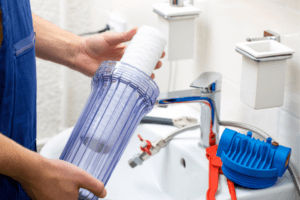
Protects against water contamination
There are many contaminants that can get into your water supply and cause harm, including lead, bacteria, and pesticides. Even though your municipality’s water treatment plant works hard to remove most of these contaminants from the water, a water filter provides an extra level of protection against them.
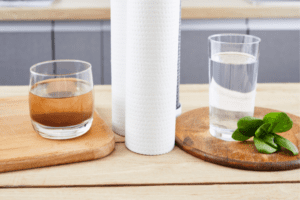
Convinced? Contact Oak Plumbing for a water filter today!
The founders of Oak Plumbing prioritize giving excellent customer service, supporting our community, and improving plumbing standards. We realize that the safety of your family is always a top priority for you too. With this in mind, we use only modern technology while still adhering to old-fashioned values. This way, you can have peace of mind knowing your home is safe with us . Our team at Oak Plumbing is also pleased to let you know that most of our clients leave five-star reviews! So please don't hesitate calling us if you need assistance.

